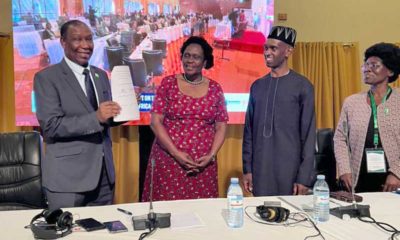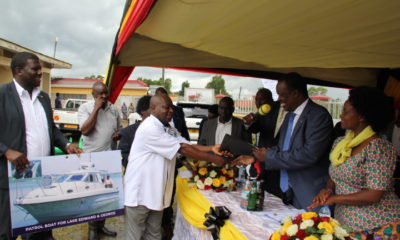News
Uganda hands over Nile leadership baton to Ethiopia

Kebede Gerba, Ethiopia’s Assistant Water and Electricity Minister hands a courtesy gift to his counterpart Sam Cheptoris
Uganda this week handed over the leadership of the Nile Council of Ministers’ meeting to Ethiopia. The rotating leadership of the Nile Council of Ministers – which follows an alphabetical order, was supposed to have gone to Burundi, and later Egypt, but it was agreed that Ethiopia takes up the mantle after Burundi expressed unpreparedness to lead. Egypt’s lack of full participation in Nile discussions in recent years, meant that it could not take up leadership of the regional body’s top policy making body.
Ethiopia’s State Minister for Water, Irrigation and Electricity Kebede Gerba, who represented Dr. Eng. Sileshi Bekele, took up the instruments of power on Thursday in Entebbe, Uganda during the 25th Nile Council of Ministers meeting.
Uganda’s Minister of Water and Environment Sam Cheptoris, who has held the chair over the past one year, handed over the NBI flag in a symbolic peaceful transfer of power.
In his handover speech, Cheptoris reflected on the unsuccessful bid by Uganda to woo Egypt back into full participation as having been the highlight of his leadership. Several high-level meetings involving Heads of State or their representatives of all 10 Nile Basin Countries were held in Uganda
Uganda’s efforts to have Egypt endorse the Cooperative Framework Agreement (CFA) that was developed and endorsed by most member countries that share the Nile, stem from the core understanding that there are far greater benefits from cooperation in the utilisation of the river’s resources as opposed to pursuing individual projects.
Egypt’s insistence on using colonial-era un-negotiated pact that gave it and Sudan full rights over the Nile’s water’s is at variance with the CFA’s underlying philosophy of equal rights and hence the need for cooperation as well as the need for sustainable utilisation.
Egypt’s refusal to appreciate the rights of other countries in the basin over the waters of the Nile, appears to have diverted the rest of the countries’ attention only temporarily.
The endorsement by the Nile-Com of the NBI secretariat’s 10-year Strategic Plan, is testament to the determination by member countries to use the Nile’s resources to meet the enormous development challenges facing the basin countries, but also through a cooperative basis.
The strategy is anchored on six goals; I.e
1. Increasing hydro power development and power trade,
2. Improving food security
3. Protecting and restoring water related ecosystems
4. Improving resilience to climate change
5. Strengthening trans boundary water governance in the basin
6. Enhancing the availability and sustainable management of trans boundary water water resources.
Innocent Ntabana, the NBI Executive Director hailed the endorsement of the 10 year strategy as a result of team work and Cooperation among technocrats from member countries:
“This is a culmination of a long process we went through, right from the identification in understanding of the challenges of the basin challenges, consultations with countries on how these challenges can be addressed.”
Still mired in poverty while at the same time facing rapid population growth, the Nile Basin Countries are facing daunting challenges in the coming ten years. For example, in Uganda alone, the country’s population expected to have increased nearly 20 million to 56m people in 2030.
Without increasing land for agriculture amidst climate change, food and water are forecast to come in short supply.
Comments


























